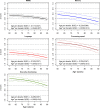Age-related cognitive decline and associations with sex, education and apolipoprotein E genotype across ethnocultural groups and geographic regions: a collaborative cohort study
- PMID: 28323832
- PMCID: PMC5360220
- DOI: 10.1371/journal.pmed.1002261
Age-related cognitive decline and associations with sex, education and apolipoprotein E genotype across ethnocultural groups and geographic regions: a collaborative cohort study
Abstract
Background: The prevalence of dementia varies around the world, potentially contributed to by international differences in rates of age-related cognitive decline. Our primary goal was to investigate how rates of age-related decline in cognitive test performance varied among international cohort studies of cognitive aging. We also determined the extent to which sex, educational attainment, and apolipoprotein E ε4 allele (APOE*4) carrier status were associated with decline.
Methods and findings: We harmonized longitudinal data for 14 cohorts from 12 countries (Australia, Brazil, France, Greece, Hong Kong, Italy, Japan, Singapore, Spain, South Korea, United Kingdom, United States), for a total of 42,170 individuals aged 54-105 y (42% male), including 3.3% with dementia at baseline. The studies began between 1989 and 2011, with all but three ongoing, and each had 2-16 assessment waves (median = 3) and a follow-up duration of 2-15 y. We analyzed standardized Mini-Mental State Examination (MMSE) and memory, processing speed, language, and executive functioning test scores using linear mixed models, adjusted for sex and education, and meta-analytic techniques. Performance on all cognitive measures declined with age, with the most rapid rate of change pooled across cohorts a moderate -0.26 standard deviations per decade (SD/decade) (95% confidence interval [CI] [-0.35, -0.16], p < 0.001) for processing speed. Rates of decline accelerated slightly with age, with executive functioning showing the largest additional rate of decline with every further decade of age (-0.07 SD/decade, 95% CI [-0.10, -0.03], p = 0.002). There was a considerable degree of heterogeneity in the associations across cohorts, including a slightly faster decline (p = 0.021) on the MMSE for Asians (-0.20 SD/decade, 95% CI [-0.28, -0.12], p < 0.001) than for whites (-0.09 SD/decade, 95% CI [-0.16, -0.02], p = 0.009). Males declined on the MMSE at a slightly slower rate than females (difference = 0.023 SD/decade, 95% CI [0.011, 0.035], p < 0.001), and every additional year of education was associated with a rate of decline slightly slower for the MMSE (0.004 SD/decade less, 95% CI [0.002, 0.006], p = 0.001), but slightly faster for language (-0.007 SD/decade more, 95% CI [-0.011, -0.003], p = 0.001). APOE*4 carriers declined slightly more rapidly than non-carriers on most cognitive measures, with processing speed showing the greatest difference (-0.08 SD/decade, 95% CI [-0.15, -0.01], p = 0.019). The same overall pattern of results was found when analyses were repeated with baseline dementia cases excluded. We used only one test to represent cognitive domains, and though a prototypical one, we nevertheless urge caution in generalizing the results to domains rather than viewing them as test-specific associations. This study lacked cohorts from Africa, India, and mainland China.
Conclusions: Cognitive performance declined with age, and more rapidly with increasing age, across samples from diverse ethnocultural groups and geographical regions. Associations varied across cohorts, suggesting that different rates of cognitive decline might contribute to the global variation in dementia prevalence. However, the many similarities and consistent associations with education and APOE genotype indicate a need to explore how international differences in associations with other risk factors such as genetics, cardiovascular health, and lifestyle are involved. Future studies should attempt to use multiple tests for each cognitive domain and feature populations from ethnocultural groups and geographical regions for which we lacked data.
Conflict of interest statement
I have read the journal's policy and the authors of this manuscript have the following competing interests: JDC is supported by the National Health and Medical Research Council of Australia (NHMRC Program Grant ID 568969). CB is a member of the Editorial Board of PLOS Medicine. FEM is a member of the Editorial Board of PLOS Medicine. RBL is the Edwin S. Lowe Professor of Neurology at the Albert Einstein College of Medicine in New York and receives research support from the NIH; receives support from the Migraine Research Foundation and the National Headache Foundation and serves on the editorial board of Neurology and as senior advisor to Headache; has reviewed for the NIA and NINDS, holds stock options in eNeura Therapeutics; serves as consultant, advisory board member, or has received honoraria from American Academy of Neurology, Alder, Allergan, American Headache Society, Amgen, Autonomic Technologies, Avanir, Biohaven, Biovision, Boston Scientific, Colucid, Dr. Reddy’s, Electrocore, Eli Lilly, eNeura Therapeutics, GlaxoSmithKlein (formerly Novartis), Merck, Pernix, Pfizer, Supernus, Teva, Trigemina, Vector, Vedanta; and receives royalties from Wolff’s Headache, 8th Edition, Oxford Press University, 2009, Wiley and Informa. MJK is funded by NIH/NIA and the following private foundations: Czap Foundation, Sylvia and Leonard Marx Foundation and also receives consultation fees from Eli Lilly and Company. HB has received departmental grants for drug trials from Lilly, Merck, Sanofi, Servier and Tau Therapeutics; is on the advisory board for Nutricia and has been asked to be an advisor to Lundbeck, Otuska and Eli Lilly; and is on clinical advisory committees for Montefiore Homes and Cranbrook Care, both of which operate residential/ long-term care homes. AL has received honoraria or travel fees from Lundbeck and Sanofi. PSS would like to acknowledge financial support from the National Health & Medical Research Council (APP1093083), the Vincent Fairfax Foundation and the Yulgilbar Foundation for COSMIC. All other authors declare no competing interests.
Figures



References
-
- Lines LM, Sherif NA, Wiener JM. Racial and ethnic disparities among individuals with Alzheimer's disease in the United States: A literature review (RTI Press publication No. RR-0024-1412). Research Triangle Park (NC): 2014.
Publication types
MeSH terms
Substances
Grants and funding
LinkOut - more resources
Full Text Sources
Other Literature Sources
Medical
Miscellaneous

